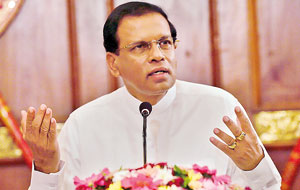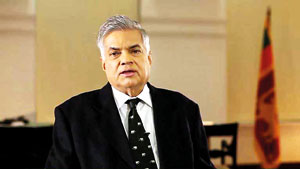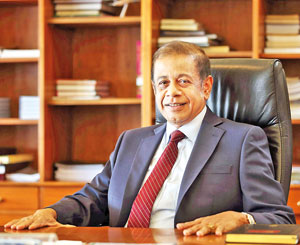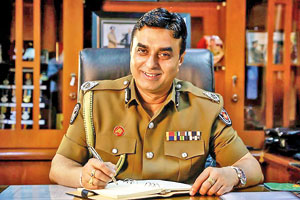Columns
Nation demands answer: Who are the guilty men?
View(s): Now that the nation has buried its dead and observed a decent period of mourning, it’s time life limps back to normalcy. But even as it takes the first tottering steps in that direction, one nagging question refuses to go away.
Now that the nation has buried its dead and observed a decent period of mourning, it’s time life limps back to normalcy. But even as it takes the first tottering steps in that direction, one nagging question refuses to go away.Who are the guilty men?
And the whole nation calls, in the midst of their grief and shock, to exhume from the grave of Lanka’s gross negligence and complacency upon which Muslim fanatics were allowed to dance in wild abandon to find their passage to heaven’s door, the moribund carcass of responsibility; and to find as to who were really responsible, singularly or collectively, for the catastrophe that was waiting to happen; and which could have been averted if not for the negligence and even the collusion of its political masters.
The question nags and tests a nation’s credulity. How come that, with such a wealth of intelligence as to the formation, funding, and the rise of NTJ from obscurity to national prominence — from smashing Buddha statutes in Mawanella to bombing Catholic churches in Colombo, Negombo and Batticaloa and blasting seven-star hotels in the city — no one in the know of the flood of information available, was moved to act to avert Easter Sunday’s holocaust?
It’s not merely that the three warnings delivered by the Indian intelligence service to their Colombo counterparts went largely ignored. The litany of lapses go far beyond in time and smacks not merely of criminal negligence as it surely is but, worse, of active collusion considering how the authorities, both in this Government and in the previous regime, naively allowed the NTJ to be born, boom and flourish and bring the nation to its knees swathed in tears and stricken with fear.
Who are the guilty men that brought Lanka to this sad, calamitous pass? Perhaps we will never know. But let’s ask the men at the helm, what they have to say in their defence. And let’s start at the very beginning. And a very good place to start is right at the top.
THE PRESIDENT

PRESIDENT: No one told me
Like a duck takes to water President Sirisena swiftly moved to renounce all knowledge of the impending threat. He passed the buck to his defence secretary, whom he had employed just five months before. He, the President of the country, in charge of defence and law and order, had been kept in the dark, estranged from even a tit bit of intelligence the Indian intelligence service had communicated to their counterpart in Colombo. Not only did he deny prior knowledge but even stated he was ignorant that the attack had taken place until someone showed him on a cell phone the carnage that had occurred.
He said in his May Day address to the nation: “I got to know of the carnage when I was in Singapore on the 21st around 10 am. The moment I got to know it, the first thought that came to mind is the question that many in Lanka ask now. How did it happen? At noon that day I phoned the defence secretary and told him to immediately appoint a presidential commission to probe how it happened. I even gave him the names of who should be appointed to the commission. On the 23rd the commission became active and all of you have the right to make your suggestions to it now.”
Wow! A presidential commission to probe the affair appointed within forty-eight hours of the carnage? And the orders given from Singapore where the president was holidaying. How’s that for immediate action? Impressive, isn’t it?
Then the Minister of Defence and Law and Order, President Sirisena, went onto say: “The IGP and the defence secretary could have easily averted this great carnage. They had all the means to do so. But they did not discharge their responsibility.”
Now for the tear jerker: He said: “I do not love my life. I am a person who has died and been resurrected five times. The LTTE came with their suicide bombers to kill me. They got killed. I have seen on Facebook extremists stating that soon I will be destroyed. I am not afraid of death. I will discharge my responsibility to protect the nation.”
Good. And hopefully the public can have a peaceful night of sleep, and rest assured that their lives are in safe hands. For the common people on the streets do not have the security he is fortunate enough to have. And look up to him from the carnage for protection. Those who died two Sunday’s ago, unlike cats who have nine lives to waste, had only but one. One may live nine times but die only once.
And for the record, the President said: “I must specially state that the intelligence received by the responsible intelligence chiefs have not been communicated even to me.”
As the President told at the meeting of the editors last week, he was simply clueless. Before and after.
He said: ‘After the attack, the persons with me informed me that they had got messages to the effect that an attack had been carried out in Sri Lanka. An hour later they showed me reports on social media that there has been an advance warning about the possible attacks’. The warning was reportedly received on April 4, but I left the country only on April 16, but I was not alerted.’
Tells a sad tale of good governance, does it not?
THE PRIME MINISTER

PM RANIL: Blames Parliament
If the President passed the buck to his defence secretary and to the Inspectors General of Police, Prime Minister Ranil Wickremesinghe passed the blame to the entire Parliament, specifically to those in the Opposition for blocking enactment of his Counter Terrorism Bill, set to replace the Prevention of Terrorism Act.
In an interview with the Daily Mirror on Monday, Ranil Wickremesinghe claimed that the Easter Sunday attacks would have been prevented if the new Counter Terrorism Bill had been passed in Parliament.
He said: “No anti-terrorism law in Sri Lanka provides for territorial jurisdiction under which a cadre belonging to an international terrorist organisation could be arrested in Sri Lanka if they are found. Not even the penal code provides that provision.”
“We have included this provision in the new Counter Terrorism Bill. However, it is stuck in Parliament for months. Easter Sunday attacks would have been prevented if this legislation was passed,” he said.
If Maithripala Sirisena expressed that view he could have, perhaps, been forgiven. He is, after all only a diploma holder in Agriculture and all at sea with the law. But coming from the lips of the Prime Minister who is a law graduate from the University of Colombo and an attorney-at-law, to boot, it leaves much to be desired.
Consider this for example: According to the prime minister’s statement that “a cadre belonging to an international terrorist organisation could not be arrested in Sri Lanka if they are found,” then Lanka for these last five years would have been the ideal safe haven for international terrorists to have found refuge in. Had he been alive, Al Qaeda’s Osama Bin Laden would not have had to sweat it out in some Pakistan dinghy flat when he could have enjoyed paradise on Lanka’s beaches sipping a mocktail of his choice and giving orders on his cell for others of his kin to enter heaven by blasting infidels.
The Prime Minister also stated that “it is not even in the Penal Code.” Perhaps he read the wrong law book.
According to him a foreign terrorists could have lived and operated freely in Lanka, and the forces and the police could have done nothing about it merely because the Counter Terrorism Bill was blocked by Parliament.
Funny isn’t it that while laws are there to deport a young British girl who is found to have a Buddha image tattooed on her arm is arrested at the airport, produced before the magistrate and then remanded and deported as happened three years ago, a known foreign terrorist could come to Lanka and live unmolested without fear of arrest and deportation? No one is saying that a foreign terrorist should be tried here and imprisoned here? That is not this country’s business. Deportation from Lankan soil of such manifested evil would have sufficed.
ISIS leader al-Baghdadi who had gone missing for the last three years and had suddenly surfaced to comment on the Easter Sunday carnage and praise his cadres, must be ruing his ignorance of not being aware that Lanka was a safe house for him and his demons of death to take safe refuge in.
But the law was and is there. And has always been there for the last so many years. It was just that it was not enforced. Perhaps the Prime Minister should revisit his law books and find in the Extradition Act, the right to deport undesirable aliens, the same Act he used this week to order the deportation of 600 Muslim teachers who had been teaching at Madrasa schools in Lanka. If he could have used that general law of the land to do so, what on earth made him say that there was no law to arrest, question, detain and deport a foreign terrorist?
The Prime Minister also said, “informing political leadership on the impending attacks on Easter Sunday was not important as Defence authorities should have acted upon the warnings given by the intelligence units on the Easter Sunday attacks.”
Then why on earth must this nation have to spend billions every year on politicians, if the whole security and defence of the realm could be delegated to the military and allow them do as they please under permanent martial law? And condemn the nation’s security to be permanently under the jackboot of a dictator? Life may be more secure but, sans one’s fundamental freedom, where is life’s quality?
Ranil Wickremesinghe further added: “There has been no breakdown in the intelligence services but the issue has been that the Defence authorities had not acted upon the warnings.”
Exactly. That is why a political leadership is vital in a democracy. To supervise, to direct, to give leadership and be held accountable to the people. The whole concept of ministerial responsibility is based on that. That the Minister takes the responsibility for the commissions and omissions of the civil service under him. Not for him to wash his hands of and blame it on them. If any minister does so, he makes himself redundant. It’s the minister who was voted to public office by the people. It’s the Minister who is responsible to the people. Not the public servant. He is only responsible to his minister. And the political master responsible to the people. That’s what the system is all about. It’s what’s called Democracy. Something that’s closely akin to the Lichivy system he knows so much about.
EX DEFENCE SEC

HEMASIRI FERNANDO: No big deal
If the President made his lame duck excuses and, like a duck taking to water, blamed his underlings for the carnage, his Defence Secretary Hemasiri Fernando was akin to a fish out of water.
He had been the original recipient of the information provided by the National Intelligence Chief that according to information received from India’s intelligence sources that churches were targeted for attack by identified Muslim terrorists on Easter Sunday.
But what did he do with it? Like pearls thrown before swine, he did not realise, it seems, its intrinsic value and merely passed it on to the Inspector General of Police. He did not bother to follow it up. He failed to inquire what action had been taken. And he, in what must tantamount to a criminal dereliction of duty, failed to inform his boss of all bosses, namely his defence minister, the president, in whose palms the security of the nation ultimately rests.
And worse, he flapped his mouth off to the international media. And with his seeming nonchalance and boorish swagger, sealed his own fate.
He said, without realising the gravity of what he was saying that he knew of the threat but that he ‘never expected an attack of this magnitude to take place.’ “I though it will be an isolated instance in certain places,” he squeaked.
Speaking to the media, Fernando said, “Intelligence never indicated that it’s going to be an attack of this magnitude. They were talking about isolated incidents. Besides, there is no emergency in this country. We cannot request the armed forces to come and assist us, we can only depend on the police.”
Worse was to follow. And it was his callous approach, even after two hundred people had died due to his failure to take the matter seriously and gauge, without experience of any kind, what the magnitude of the attack would be when he casually observed that “Sri Lanka had experienced similar tragic situations, despite security checks in place. It’s not the first time a bomb went off in this country. Why are you trying to isolate this unfortunate incident?”
But even worse was to follow. To add insult to injury, this mediocre administrator, elevated from his bureaucratic desk to be the civil servant in charge of the nation’s defence, overlording the nation’s triple military guarding deities, by President Sirisena for no apparent reason based on any qualification or experience, he had the insensitivity to state: “Many countries have faced similar security issues in the past. “It happened in New Zealand, unexpectedly. We need to make sure that similar things will not take place in the future.”
And then he went onto say, “I can’t say with confidence anything about with terrorism. No country in the world can assure that it’s not going to happen. But we’re trying our best.”
But even before he had finished his interview with the media, it became clear that his number was up. And the question was asked by all: Why did he not tell the President?
The President duly asked for his resignation. And Hemasiri Gernando, having no choice, duly handed it over.
But does resignation alone absolve one from all responsibility?
Especially when the All Ceylon Jammiyathul Ulama (ACJU) President Sheik M.I.M. Rizwi Mufti said: “I am the first to reveal the presence of IS terrorists in Sri Lanka way back in 2014. I informed the then Defence Secretary Gotabaya Rajapaksa about it but nothing was done.”
Can one be responsible for such a terrible tragedy which has killed so many, brought the nation to a halt, destroyed its economy and nullified all the efforts taken to promote tourism, led to the introduction of emergency law and tolled back the tide of democracy and placed civil life in peril — can one be responsible for all this and more merely resign and simply walk away free into the sunset without facing charges of criminal negligence? Unless, of course, he was the scapegoat – this five month presidential mascot — led before the public to slaughter and reprieved by presidential fiat at the eleventh hour.
THE IGP

IGP: Passed the letter
The presidential axe also fell on the Inspector General of Police Pujith Jayasundera last week when Maithripala Sirisena asked for his resignation as well. He had been one of the first recipients to have received notice of the threat as sent by the national Intelligence Chief who had received it from Indian intelligence sources. He read it and merely passed it down to his DIGs. His offence: No follow-up action. He has still not resigned and has placed his fate in the hands of the Constitutional Council which will no doubt deliver the chop in the coming week.
Odd, isn’t it, when one thinks about it, how so many in the services knew, including the civilian Hemasiri Fernando the President’s own defence secretary but none thought it fit to inform the political leadership of the threat?:
The then defence secretary says he thought the attacks would be no big deal, the President says no one informed him of the threat before the event and even after the event, the Prime Minister says that informing political leadership on the impending attacks on Easter Sunday was not important as Defence authorities should have acted upon the warnings given by the intelligence units on the Easter Sunday attacks, the IGP passes the letter to his DIGs and thinks of it no longer, out of the DIGs only one takes the trouble to write to the Director of VIPs Security Detail tasked to protect VIPs — not churches, mind you — and none of them informs those they are charged to protect, Mahinda Rajapaksa states that though his security detail knew, he did not – it would have been so funny had it not been so tragic.
Perhaps senior UNP Minister John Amaratunga summed it up best to reflect the prevailing political mood and insouciance when he declared at a news conference last week: “What has happened has happened, we have suffered loss, the damage has been done”.
Hopefully, in deference to the memory of those who lost their lives and the families they left behind to grieve their irreplaceable loss, he was not implying that the nation should not be crying over spilled blood?
| One question for Maithri and Ranil Did Indian High Commissioner alert them? As the SUNDAY PUNCH stated last week, the Indian intelligence warned their counterparts in Colombo not once, not twice but thrice. The first warning, it is said, was given on April 4 the second the day before the attacks, the third hours before the attack. And it was thrice ignored. Indian intelligence was not a general warning. It was what is called ‘actionable intelligence. It did not merely state that there would be attacks but specifically stated that churches and the Indian High Commission would come under attack on Easter Sunday. Is it unreasonable to assume that the top most concern and priority of the Indian intelligence service would have been the safety of its own High Commission in Colombo and its consulate in Kandy? They would, no doubt, have informed the Indian High Commission of the potential threat, they had extracted from an ISIS suspect in Indian custody. In such a situation, wouldn’t the Indian High Commissioner have called on the President and or the prime Minister and requested protection for the premises? True, there is an Indian contingent within the premises to guard it from terror attacks even as the US Embassy has a contingent of US marines. But they cannot step out of the premises but has to remain within the sovereign territory of their own country, namely the diplomatic premises. The question posed to both the President and the Prime Minister is: Did the Indian High Commission approach either and apprise them of the terror threat to the Indian High Commission and to the churches on Easter Sunday? The Indian High Commissioner would not have talked to the defence secretary directly since it’s against diplomatic protocol to talk to a public servant. Perhaps, it’s best, to clear the foul air, that both the President and the Prime Minister issue an unambiguous statement whether or not the Indian High Commissioner made such a request for Lankan police or troops to guard its entrance and act as a bulwark against the threat its own intelligence service had provided. A simple ‘yes’ or a simple ‘no’ will do. Or did the Indian High Commissioner, too, even with his own High Commission under threat, keep the President and Prime Minister of Lanka in the dark? | |
 CARDINAL RANJITH: Cometh the hour, cometh the man Cardinal Ranjith: Man of the hour Pope phones Cardinal to bestow blessings His Eminence Malcolm Cardinal Ranjith, Archbishop of Colombo, has risen immeasurably in the eyes of his fellow men to be the true shepherd of Lanka’s Catholic flock to lead them from despair’s darkness to God’s own comforting heavenly light. And as things would have it, it has taken the worst of times to bring out the best in him. And, no doubt, he is seen in the Holy See as a rising star in the papal firmament. On April 24, three days after the Easter carnage, His Holy Father Pope Francis sends him a letter. He writes: “Conscious of the wound inflicted on the entire nation, I likewise pray that all Sri Lankans will be affirmed in their resolve to foster social harmony, justice and peace. With these sentiments, I affectionately commend you and your Brother Bishops. And the cardinal on May 2 writes to his His Holy Father. He says: “Your presence with us on this sad occasion strengthens me and our community.” At 11 am that same day, Cardinal Ranjith’s phone rings at the Bishop’s House in Colombo.. It is from Pope Francis. He gives him benediction, praising him for the tremendous work done by his to uplift the spirit and souls of those who had suffered greatly in the tragedy. And, like the Phoenix that rises from the ashes, who knows – for the church works in mysterious ways – whether at the appropriate hour at a future conclave of cardinals assembled to elect a new pope, white smoke will emit as the signal to herald the advent of the world’s first Asian Pope? Malcolm Cardinal Ranjith. Ad Multos Annos!
|


Leave a Reply
Post Comment